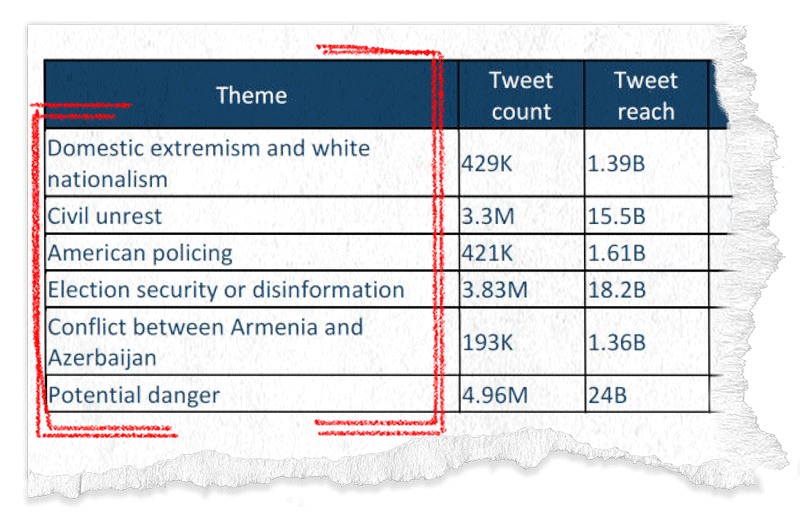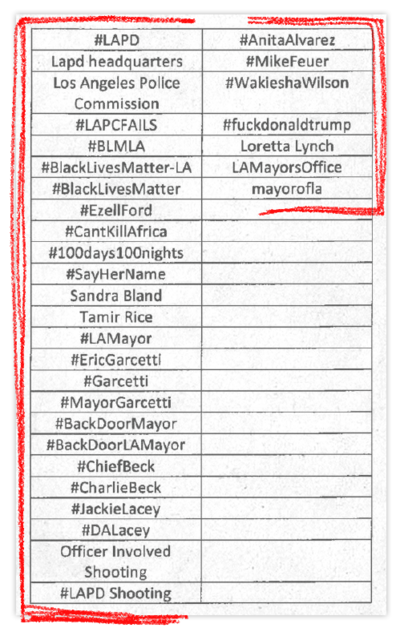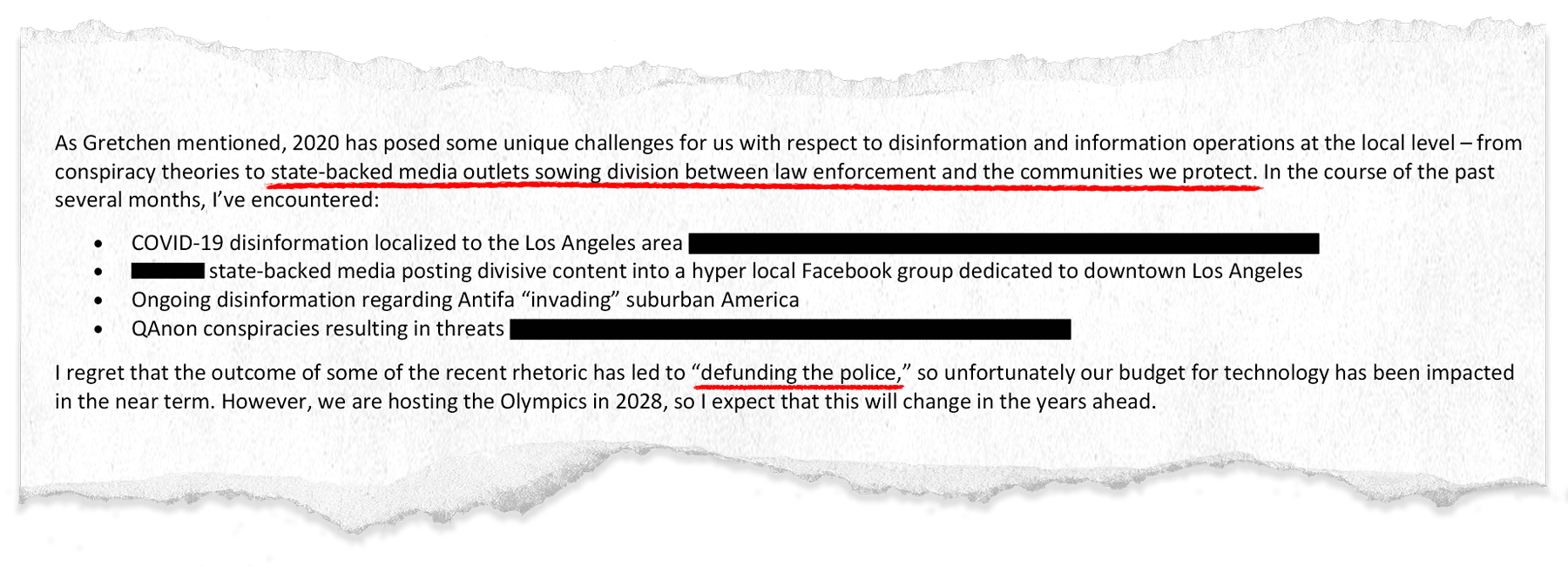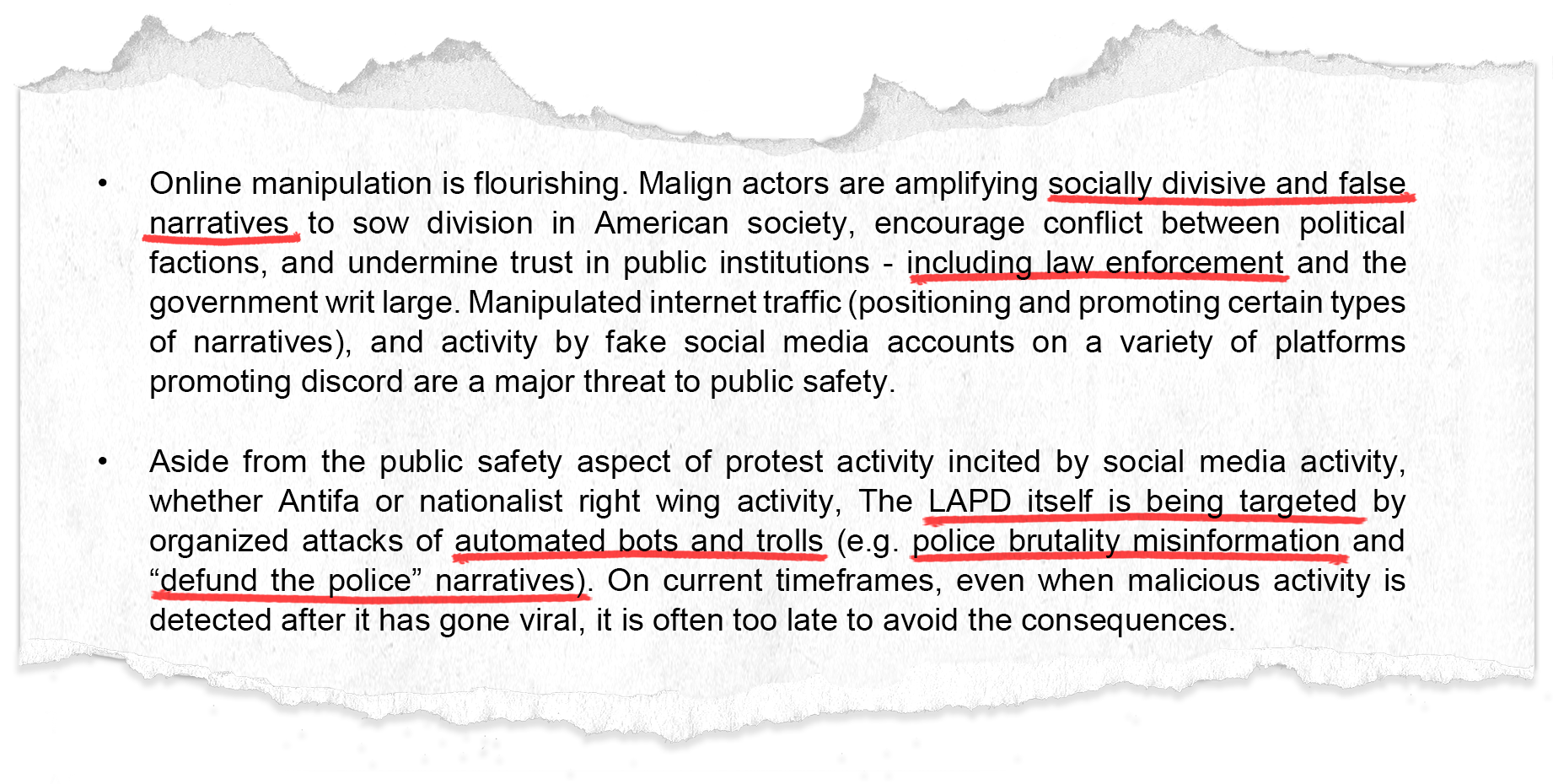The Los Angeles Police Department piloted social media monitoring software that vacuumed up millions of tweets in October and November 2020 from users throughout the United States, according to internal documents released Wednesday by the Brennan Center. The monitoring tool, ABTShield, was developed by Polish software company EDGE NPD. A large portion of the posts collected were about police reform protests, raising serious concerns about the impact on First Amendment rights.
Over the last several months, the Brennan Center has released numerous documents obtained through a freedom of information lawsuit. They reveal the LAPD’s use of third-party monitoring tools and other social media collection mechanisms to amass data on innocent people and track racial justice activists, often in violation of social media platforms’ policies. The LAPD’s trial of ABTShield is yet another example of the department’s misguided efforts to carry out its public safety mandate through broadscale social media surveillance.
ABTShield’s service for the LAPD focused solely on Twitter, assembling daily reports on how many people tweeted about various topics selected by the police department. In its sales pitches, EDGE NPD claimed that ABTShield was uniquely positioned to help government agencies combat the disinformation and foreign malign influences that undermine public trust in institutions.
However, the LAPD used the service largely to collect information far afield from disinformation, tracking communications in six categories: civil unrest, American policing, white nationalism and domestic extremism, potential danger, and the conflict between Armenia and Azerbaijan (due to the large Armenian population in Los Angeles), in addition to election security and disinformation.
 EDGE NPD/Los Angeles Police Department
EDGE NPD/Los Angeles Police Department
The LAPD and EDGE NPD jointly came up with the terms underpinning ABTShield’s daily searches. (The Brennan Center received the list of keywords that the LAPD requested, but EDGE NPD subsequently added additional terms, which the LAPD evidently agreed to; the LAPD did not produce — and apparently never received — the final list of keywords.) Using these terms, ABTShield pulled in vast quantities of mostly irrelevant information, much of which implicated Angelenos’ First Amendment rights. Indeed, on the first day of the pilot, ABTShield collected so many tweets that its system could not handle the volume of data, prompting EDGE NPD to cut off its transmissions at 10,000 tweets per topic per day. A huge volume continued to pour in throughout the trial period, totaling nearly 2 million tweets, an average of almost 70,000 per day. And this was a small fraction of the data haul that ABTShield brought in; according to EDGE NPD, it collected some 200 million tweets over the life of the pilot, sending only a selection of those to the LAPD.
The Brennan Center’s assessment of the data using the list produced by the LAPD, augmented by the terms EDGE NPD stated it was adding, shows that the 20 most mentioned keywords accounted for slightly over 75 percent of all keyword “hits” in the tweets that ABTShield delivered to the LAPD. These terms were all extremely vague, highlighting questions about the value of this effort, if any.
Notwithstanding this flood of data, the department commended ABTShield as a “powerful tool” that helped “parse out the proverbial ‘signal from the noise,’ and assess the veracity and reliability of online content . . . .” None of the communications or documents produced by the LAPD indicate how ABTShield assisted in analyzing the “veracity and reliability” of the enormous volume of online data it sent to the department.
ABTShield also collected the username associated with each flagged tweet and provided it to the LAPD. ABTShield’s collection of this data for law enforcement purposes raises significant privacy concerns and seemingly violates Twitter’s prohibition against scraping and use of its data for surveillance purposes by developers. Indeed, ABTShield’s searches recall those that Geofeedia used at the LAPD’s direction in 2016; Geofeedia’s relationship with law enforcement was what originally prompted Twitter to forbid the use of its data for surveillance purposes.
 Los Angeles Police Department
Los Angeles Police Department
The LAPD’s retention of the data is likewise troubling and raises concerns about future use of the tweets — stripped of their original context — for other purposes.
The documents also shed light on how the LAPD views activist movements — in particular, that activists and movements are likely being treated as threats or sources of disinformation without any evidence to support that categorization. The LAPD’s “civil unrest” category, for example, included terms focused on nonviolent protests, like “protest,” “solidarity,” and “lives matter,” which would have pulled in online activity related to Black Lives Matter (BLM). It would have retrieved activity related to Blue Lives Matter as well, but since that term was separately included in the American policing category, “lives matter” appears to have been primarily directed at eliciting BLM-related tweets. Yet the department made no attempt to show that the discussions of the BLM movement posed a risk to public safety — nor could it credibly have done so, in light of the evidence indicating that BLM-inspired protests across the United States were overwhelmingly nonviolent.
In addition, LAPD officers represented in emails that “defund the police” and some BLM narratives were conspiracy theories peddled by foreign actors, proffering that “conspiracy theories” and “state-backed media outlets” had eroded public trust in the LAPD and led to “defunding the police.” Another officer, while acknowledging that “MANY legitimate voices” use the phrase BLM, suggested it was “wise” to include the term in the keyword list based on a 2017 article reporting that some Facebook ads targeting Black communities were bought by Russians in the runup to the 2016 election.
 Los Angeles Police Department
Los Angeles Police Department
EDGE NPD echoed this sentiment, saying “the LAPD itself is being targeted by organized attacks of automated bots and trolls (e.g., police brutality misinformation and ‘defund the police’ narratives).” Needless to say, BLM and “defund the police” are homegrown campaigns, themselves targets of disinformation by foreign and domestic actors. Even if foreign actors were occasionally masquerading as domestic activists, there is no evidence that either ABTShield or LAPD officers could discern which tweets were legitimate and which were “disinformation” based solely on keyword searches.
 EDGE NPD/Los Angeles Police Department
EDGE NPD/Los Angeles Police Department
This unfounded suspicion of activist groups puts protesters, especially people of color, at risk of harm and contributes to the erosion of public trust in the police. It can also spill into offline violence: the Los Angeles City Council published a report in March 2021 indicating that the LAPD mishandled its response to the George Floyd protests in 2020. Similar conduct by the law enforcement community nationwide, which has responded to protests with violence, illustrates the urgency of police reforms.
Additionally, the LAPD asked EDGE NPD to monitor the Twitter activity of at least three specific social media handles, from which ABTShield compiled 1,467 tweets that predominantly discuss protests. One is an account that shares information about protests collected from police scanners and civilian reports. The other two are anti-fascist groups. The LAPD’s choice to track anti-fascist accounts is another example of suspicion of activists and also reflects a trend within the department to fixate on fictitious rather than actual threats to civilians and officers.
The LAPD’s reckless use of bulk collection tools underscores the urgent need for reform of social media surveillance by police to prevent further infringements on the public’s civil liberties.




